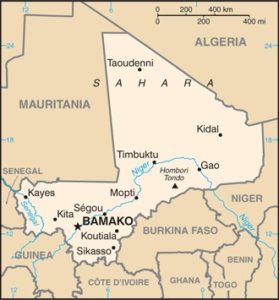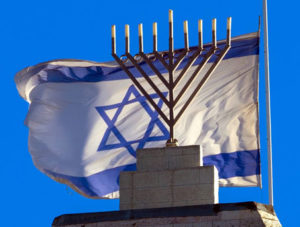 The first Jewish presence in West Africa which coincided with the arrival of the first Zuwa ruler of Koukiya and his brother, who settled near the Niger River. He was only known as Za/Zuwa Alayman (which means that “He comes from Yemen”). Some local legends state that Zuwa Alayman was a member of one of the Jewish communities which were either transported or voluntarily moved from Yemen by the Ethiopians in the 6th century C.E. after the defeat of Dhu Nuwas.
The first Jewish presence in West Africa which coincided with the arrival of the first Zuwa ruler of Koukiya and his brother, who settled near the Niger River. He was only known as Za/Zuwa Alayman (which means that “He comes from Yemen”). Some local legends state that Zuwa Alayman was a member of one of the Jewish communities which were either transported or voluntarily moved from Yemen by the Ethiopians in the 6th century C.E. after the defeat of Dhu Nuwas.
The Jewish history of Mali may goes back as far as biblical times when the Egyptian Jews settled in in the northern part of the country. During the 8th century, the Rhadanites (Jewish African, multi-lingual traders) began to settle in Timbuktu, Mali. There they established a trading center from which they set up a network of trading routes throughout the desert.
Jews also arrived in large numbers in the 14th century fleeing persecution in Spain, and migrated to Timbuktu, which was part of the Songhai Empire at that time. In 1492, Askia Mohammad I came to power in the previously tolerant region of Timbuktu and decreed that Jews must convert to Islam or be expelled from the country. Because of this some of them converted and some chose to stay in Mali.It is said that Jews controlled the salt and gold trade between Morocco and Timbuktu for some 300 years beginning in the late 1500s.
 In 1860, Rabbi Mordechai Abi Serour emigrated from Morocco with several Jews to trade in Timbuktu. Rabbi Serour had to negotiate with the local authorities to obtain “protected people” status. The newly arrived congregation established a synagogue and Jewish cemetery in the area. These Jews faced generation after generation of persecution, thus by the early 20th century no Jews remained in Mali.
In 1860, Rabbi Mordechai Abi Serour emigrated from Morocco with several Jews to trade in Timbuktu. Rabbi Serour had to negotiate with the local authorities to obtain “protected people” status. The newly arrived congregation established a synagogue and Jewish cemetery in the area. These Jews faced generation after generation of persecution, thus by the early 20th century no Jews remained in Mali.
The lack of a community existed until the 1990’s thousands of so called ‘Hidden Jews began a Malian Jewish revival in Timbuktu. A group called Zakhor, consisting of people with Jewish roots, sought to reestablish the Jewish community, by learning Hebrew, collecting the histories and preserving the cemeteries of their ancestors. Members of Zakhor recognize themselves as Jews and declare themselves to be descendants of the Jews of Touat. There are approximately 1,000 people with alleged Jewish roots in Timbuktu, Mali. Amongst these Jews, Jewish names are used and some members sign their names with a Star of David; some Hebrew songs are still sung; and they only marry among themselves.